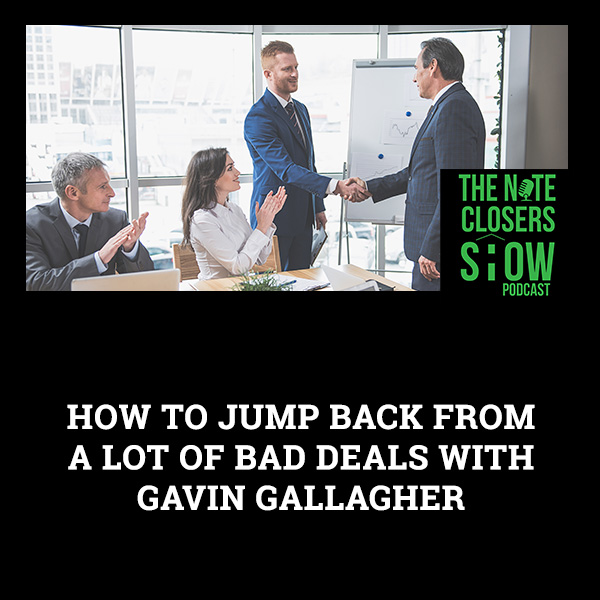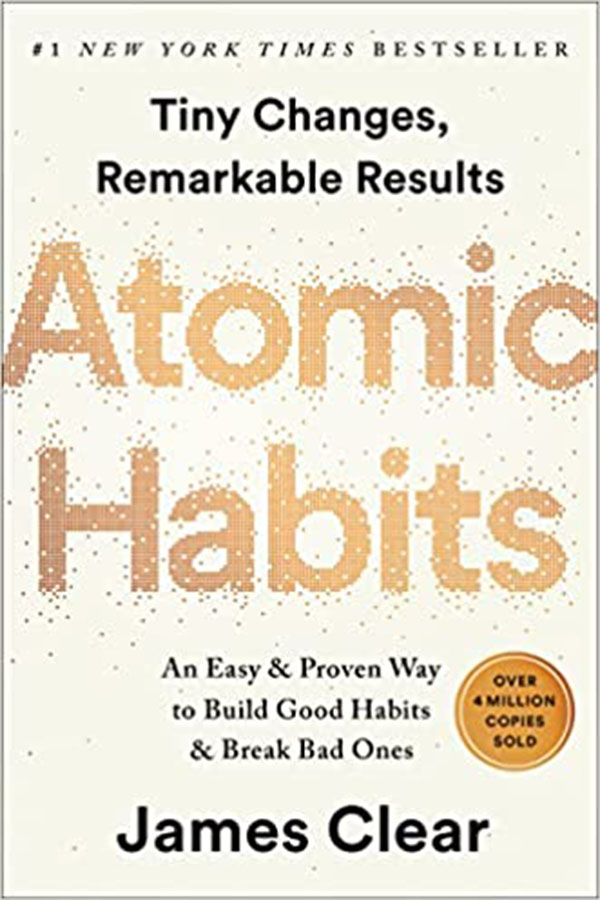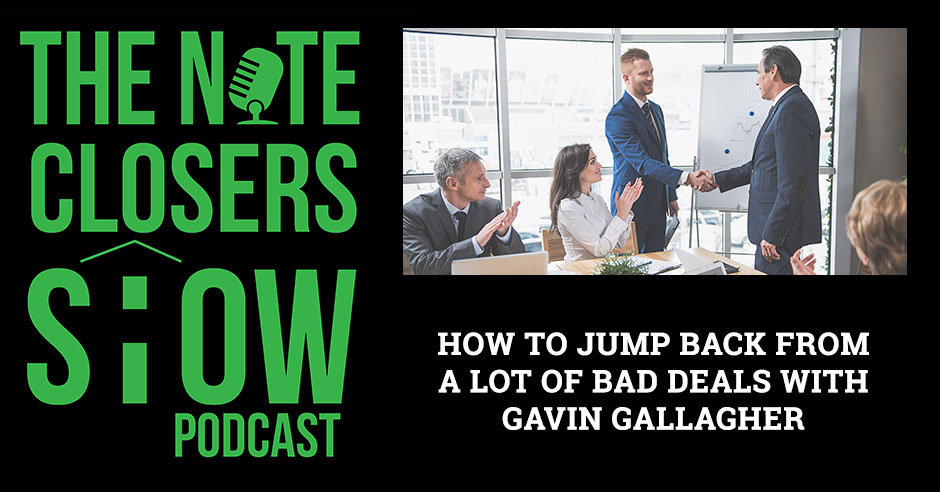
The real estate industry can be highly rewarding or extraordinarily humbling. Sometimes, those lessons of humility come in the form of bad deals. On this episode of the Note Closers Show, Scott Carson talks with international real estate investor Gavin Gallagher about some of his losses as a real estate investor. Gavin shares his story of how he almost lost everything during the last economic crash and how his mindset during an up-market led to his mistakes. He also shares how he overcame that loss to find success today in commercial properties and as a podcaster.
Want to talk to Scott? Book a call with him HERE.
—
Watch the episode here
Listen to the podcast here
How To Jump Back From A Lot Of Bad Deals With Gavin Gallagher
This is Gavin J. Gallagher. I’ve just finished an episode with Scott. We talked all about my roller coaster ride of a career where I’ve gone from making millions in a couple of months to losing millions in a couple of months, the mindset, and all of the behaviors and habits that you need to try to figure out in order to support your career and make sure you stay winning rather than losing.
—
Readers, I’m excited to have you here in this episode. I’m even more excited and jacked up for our special guest. You guys are here for a treat. I’ll tell you that now. This guy has been a real estate investor and developer for many years. He’s based out of Dublin, where he runs EastPoint Business Park. It’s a successful office park he and his family have been developing since the late ’90s. He also has a wealth of international experience.
He spent six years living and working in London, the South of Spain, Dubai, Qatar and gone on West Africa. He’s all over the place, which is great because I wanted this episode to be about investing internationally and also talking about what happens here and affects a lot of the world here in the United States market. He’s the host of the popular real estate investing podcast Behind the Facade. We are honored to have Gavin Gallagher join us. Gavin, how are you doing?
Scott, I’m doing great. That was the best intro I’ve had all day. I hope I can live up to such an intro.
I’m honored to have you here on the show. You’ve been investing for a few years. You’ve seen some ups and downs. You invested in Ireland. You and I were talking before the show as we were figuring everything out there. You’ve had good ups and some downs like everybody else. Do you want to talk a little about that?
The nation went through a bit of a roller coaster. It wasn’t that different from what the US went through in the lead-up to the 2008 crash. Our economy was coming from a much lower place. We had a very stagnated economy back in the 1990s. I was in college at the time, and around about ’95 or so, the economy started to fire on all cylinders. It just became this runaway freight train. As soon as I qualified, I was like, “I want in on this freight train.” I bought this tiny little property. It was my first deal. I paid $25,000 for it.
Within a couple of weeks after getting planning permission, I sold it to a builder for $125,000. That’s 5X return straight away. I was like, “I’m addicted. I love this.” I went on to do deal after deal like that with huge returns. One deal, in particular, was off the charts. I don’t think the calculator can calculate the IRR because I borrowed 100% of the money that I put in and put down €1 million, which at rates nowadays, is about $1 million. I put €1 million down. Every penny of it was borrowed. Six weeks later, I sold that property for €3.5 million. That’s 2.5 times the profit in 6 weeks.
I remember thinking, “This is the ultimate industry to be a part of.” That was 2006, so we didn’t quite see what was coming down the train. 2008 hit, and because of all the success that I had enjoyed in those years, your due diligence process became sketchy, and you just said, “This has worked for me before. I’m going to go and do it again.” That led to a lot of poor decisions and a couple of deals that somebody had been sitting on my shoulder and saying, “Gavin, this is not a good deal. Why are you doing it?” A lot of it has to do with ego.
Sudden success can impact the ego in a big way. It can start making you think that you’re smarter than everyone else and all this. I suffered from that quite badly. I went into a deal that I had a couple of people tell me that they were not so sure it was a great deal. I was like, “Trust me. This is a great deal.” Six years later, I was like, “How did I get into this deal?” The real estate industry is one that can be both highly rewarding and extraordinarily humbling. I had a humbling experience where the banks came after me in a big way. I spent six years where I won’t say on the run, but it felt like I was on the run.
At that time, they took my family home. I ended up getting a divorce. I ended up having to ask my brother for assistance because I couldn’t afford rent. I was on my knees when 2 or 3 years before that, I was flying first class, having a fancy car, a big house, and all that. It’s incredible how without a solid mindset and some good philosophy behind you that you can make such terrible mistakes. Unfortunately, we’ve seen that played out with the crypto market and all this kind of stuff. I’m reading about guys who had $5 or $6 million in crypto and suddenly have less than $5,000 or something. It’s fallen that much. Unfortunately, history tends to repeat itself. I try to focus on that with my own podcast now with that kind of story.
I appreciate you sharing all that. When you have success and are off rocking and rolling, a lot of times, everybody can make money in an increasing market. It’s when things change that you’ve got to have those good habits or a good foundation. Let me ask you a question. Did you have a mentor? Did you have somebody that taught you the ropes that you went to for counsel, you followed, or helped you out with things when you first got started?
I was pretty much self-taught. My father died when I was 21. He had been involved in real estate. When he died, he was in the middle of a couple of projects, and there were holes in the ground with a lot of debt and stuff. There was a baptism of fire there for my family. My mother was involved, and it was like a fire sale trying to sort out everything with him gone. I was only a young architecture student. I had no idea how the business worked. She was a happy housewife that never had any involvement in the business. My younger brother was still in school, and my younger sister was not even a teenager yet.
It was a real baptism of fire. I learned a lot, and I knew what I was doing now. The problem is, like you say, when it’s a rising market, everything seems great. When you’ve made a couple of great decisions, you can start to believe your own fantasy and stuff. I realize now that had my dad been alive and giving me advice, he would have probably slapped me over the back of the head and said like, “What’s all this first-class flight travel?” The reality is that a lot of the time, it’s impossible for somebody to get through to you when you’re having that level of success.
Unless this advice is coming from somebody at a higher level, it’s often easy to reject the advice and think, “This guy doesn’t know what he’s talking about. He hasn’t had this level of success. He’s just jealous.” I did have a couple of guys saying, “Gavin, are you sure? This looks a little bit dodgy to me.” For me, it was like, “I know what I’m doing,” whereas somebody who had lots and lots of experience might have said, “You don’t know what you are doing because you’ve made all of the golden mistakes that I made way back in my day and stuff.” I would’ve probably listened to that. It’s very hard when you’re not getting it from somebody who’s been there.
That makes sense. You started in the residential, the flipping side of the business. Did you get into the commercial side as an evolution of that?
It’s funny because residential is very accessible. A lot of people like to get into residential because you can buy small lots and things like that. What’s interesting about the difference between residential and commercial is based on the income yield. You can buy a property for $500,000 and sell it for $2 million because you’ve doubled or quadrupled the income. Whereas when you buy a residential property, it doesn’t matter if you’re getting all this extra income from it. People will still value it as a home. It can be difficult to extract that extra value from residential. Whereas with commercials, I found this little formula that was, at the time, I believed I had figured out the secret formula to becoming a multimillionaire.
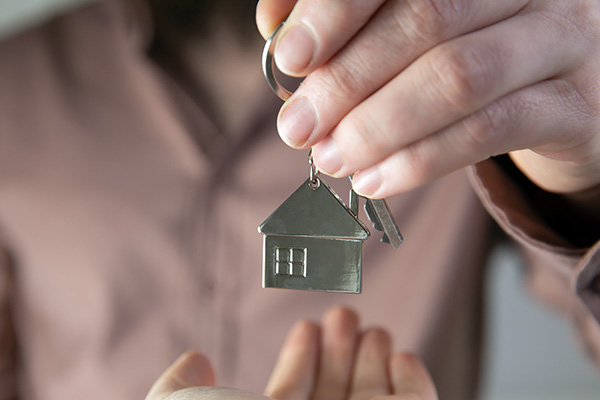
Bad Deals: When you buy a residential property, it doesn’t matter if you’re getting extra income from it. People will still value it as a home.
It was working for 4 or 5 years. It takes a bit of a lag because when you buy something, you don’t realize it’s worked until maybe two years later when you sell it. There was this lag, but I was doing deals, and when they were successful, I was going into bigger deals and leveraging up more and greater amounts. What ended up is this big pyramid. The final deal that sank me was I went abroad to the South of Spain. I got involved and put a deposit down on a €42 million shopping center. It was a major deal, and there were a lot of risks involved, but I figured I could handle it. I was going to turn it into this luxury boutique with a waterfront frontage with boats mooring up against the shops.
It would have been absolutely stunning how it worked. I closed the deal, and the same week, Lehman Brothers announced the collapse. I just knew it was game over. I tried to make it work, but it was like trying to catch a falling knife. It was a death by a thousand cuts. I had a conversation with the head of real estate, Ralph Lauren, and he was very interested until the collapse. I had the same conversation, and all projects are on hold. I was like, “What about Mr. Gucci that I spoke to?” It’s the same conversation.
I spoke to another person, and they said, “We’ll go in if you write the check for the fit-out.” I was like, “What’s that?” “We normally spend about $2.5 million on our fit-out.” I was like, “That’s the rent for the next ten years.” It was like, “No, I can’t do that.” I watched these dominoes. There are these things called adjacencies where if somebody falls, it’s like, “If they’re out, I can’t go in either.” It was this knock-on impact. It was devastating.
It’s like losing an anchor tenant. If you’ve got an anchor tenant there, and then they pull out, we don’t want to be a part of it if it’s not going to have a Sears, JCPenney, or something like that.
In this case, the scheme was a luxury boutique. There wasn’t an anchor. There was the collective interest from all the parties that made it an interesting one. When one fell, they all started to drop away.
I’ve seen in my head the South of France with all the nice high-end boutiques on the water there.
That’s exactly what I was trying to recreate.
It’s a beautiful area out there. You went through that collapsing. What happens? Did you end up having just to dump that property? Did the bank end up taking it back? It was with a Spanish bank. How’s lending in Spain? Is it easy to work with?
It was far more complicated than that. I don’t want to bore you, but given that this is the business that you’re in, what I had done was I bought this property when it was in the planning stage. There were some amazing plans showing this marina frontage where the shops were going to be and everything like that. What they were trying to do at the time, and this was a Spanish kind of mindset, was sell each individual retail unit or the boutique individually to whoever wanted it. I got to see the plans early before they sold off a load of them. I was like, “That’s going to suck. You’re going to have some guy in here going to do one thing, and it’s going to be completely uncomplementary to the guy next door. Everyone will be doing their own thing, and nobody has this shared vision.”
I said, “You should be doing this as a controlled experiment.” They’re like, “Gavin, it’s a great idea. Why don’t you do it?” They gave me the option to go and pull together that concept. I went and spent a couple of weeks researching it. When I came back, I said, “I like the idea. Let’s go for it.” I put down this binding deposit, but I had a whole year to put the deal together. I went off and spoke to a bank. Even though it was a Spanish bank, it was the Royal Bank of Scotland based in Madrid. They provided me with a funding commitment, but they didn’t give me the commitment initially because all I had done was paid the deposit.
They were going to come in with the money when the property was finished. What happened was I had to raise a load of equity. I went off and raised $12 million of equity from investors. $3 million of that came from me personally because I wanted to have a sizable chunk of the equity. There were all these rewards that I would get when it delivered certain hurdles and whatever. My equity went in, and their equity went in, and that was to start funding the deal before we had big money coming in from the bank. The equity was going to be used to go and market the thing, get all of the tenants secured, and everything like that.
The bank was going to come in with the big loan, and that was going to close out the deal. That loan was contingent on a certain income level and a certain number of mini-threshold in terms of the number of signups. Everything looked all great when we signed the agreement, and suddenly, Lehman Brothers collapsed, and everyone started dropping off. It gets to the point where we’re now below the critical threshold that these guys were like, “How are we going to go and get somebody else to come in?” I started a boutique retail shop to try to create some momentum. I said, “Look how well we’re doing here.”
I was trying everything to make this work, and it just kept dropping. In the end, the property was handed over. I had a choice of just walking away from the entire deal and losing all of the deposit and equity we had put in or restructuring the deal with the selling party. I was in an unusual situation because they were a public limited company. They had all these results that they had to deliver. They said, “If we can just get a commitment for 51% of the deal, we can sell that in the market as having completed that deal.” They were prepared for all these financial arrangements where the equity I put into date was locked in, and I was going to have five years to close out the deal with the rest.
I said, “This sounds better than losing everything now.” It’s like, “I’ve got five years to pull this thing together.” It meant five years of trying desperately to get this thing working. At the end of the five years, Spain was still in a slump. I’ve spent five years of my life trying to make this work, and it was a disaster. In the end, we lost 100% of our equity, and I lost five years of my professional career trying to make that work. In retrospect, looking back, sometimes pulling the Band-Aid off quickly is what you need to do. We made a bad mistake. It’s time to call it a loss and pull off the Band-Aid. If I had done that, I would probably moved on and did a lot of deals in the depressed market instead of spending all my time trying to rectify a sinking ship.

Bad Deals: Sometimes, pulling the band-aid off quickly is what you need to do to mitigate losses.
What I was going to ask there was if you were able to do anything on the sides of this. When you’ve got a huge anchor like that, it can drag you down. I can only imagine the sleepless nights and the stress that affected other things besides the real estate bits.
I was juggling so many negative issues at the time. The Spanish deal was a massive deal. A lot of my net worth was tied up in that deal. In addition to that, I had a lot of investments back home in Ireland that were now facing the music because the market had changed. The Irish market fell. In some segments, the market fell by 60% to 70% in value. I was looking at assets that had been very nicely valued, but loads of equity are suddenly crashing down below the level of equity that they needed to be at. Even though we were able to make interest payments and all that, they were technically in default.
I had the liquidator, which is what you guys would call maybe a Chapter 11 type thing. They appointed somebody to go in and take the asset off my hands and sell it. What was frustrating is some of these assets were sold so far below market value. If I had not had the anchor of the big project, I probably could have lined up buyers to buy it at the cheaper price and still be in for the win. It was painful. Looking back, these are life lessons that you look back and go, “Next time, that won’t happen.”
We learn more from our failures than we ever do from our victories. They stay more. It’s almost like they brand it into your mind like, “Don’t do that again.”
It’s so true. In a big win, there are almost no lessons in that, but there’s plenty of ego stroking going on like, “I made $2.5 million in 6 weeks. Let’s try and do that again.” Looking back now, I realize that was a fluke. That was Hail Mary that just happened to pay off. The reality is you would not be able to achieve that again. To get it inside your head that, “This is the deal that I’m able to do,” was a complete fantasy. You needed somebody to say, “That’s never going to be repeated again. That was a one-off. Don’t think you’re some genius who managed to get that and do it multiple times again.”
Five years go by, and you get rid of this. You’ve lost the other stuff back home in Ireland. It’s gone below, which is similar to what happened here in the States. Values are dropping in a lot of areas. Florida was worth $0.30 of the dollar compared to what it used to be. How did you start building back? How much of a mind shift do you have to say, “I can do this again in a different fashion, but a much more educated and smarter approach?” Can you share a little bit of that?
The mindset is probably the most powerful aspect of any investor’s arsenal in terms of what you’ve got. If you do not have a strong and solid understanding of where you are and the situation that you’re in, you can be in this complete fantasy land where you’re like, “I’ll make it all back. I’ll do all of this.” The reality is I spent probably 3 or 4 years blaming the world for my situation. I was like, “This is the bank’s fault. It’s Lehman Brothers’ fault.” All of this kind of stuff is going on in your head like, “I’m really rich. This shouldn’t be happening to me.”
What you really need is a wake-up call. The wake-up call was when the bank came along and did what’s known as a full rental sweep. I had lots of different real estate assets producing income. The interest payments were substantially lower than the income. I was surviving on the excess, and it was going very well. Rates were so low that there was quite a substantial surplus. I was able to maintain a certain lifestyle that I wanted. I was like, “I got to make this money back. I’m going to do this. Everything’s going to bounce back. It’s all going to be great.” It was only when I had this wake-up call when the bank told me two weeks before Christmas or something like that.
They sent me this email, “We are triggering the clause in your borrowing that says full rental sweep. Every single penny of income you get from all these properties you own will now be directed directly to us, and we’ll decide what to do with it.” In an instant, I went from having a couple of hundred thousand a year in income suddenly to zero. I was like, “What am I going to do?” Suddenly, everything is stripped out away from you. I had to go to my brother and say, “I can’t even afford rent. Help me out here.”
He had a property that was vacant and said, “Move in. Take as long as you need to get yourself back on your feet, but don’t go and do that stupid stuff again.” It was a real humbling moment but also a wake-up call where I went, “Nobody is here to rescue me.” My brother has stood in, which is great, but there’s no like, “Here’s a rope back to wealth game.” You’re going to have to wake up and do this yourself. It’s only when you take full ownership of the situation you’re in. Stop blaming other people. Stop saying it’s not your fault. It is your fault. Even if you don’t feel like it’s your fault, accept that it is your fault. The fact is where you are is the result of a decision that you made at some point in the last few years. Therefore, whether you like it or not, you’re to blame.

Bad Deals: Stop blaming other people for your own faults. You are where you are right now due to decisions you have made in the past.
There’s a great old guy that I like to listen to, Jocko Willink’s Jocko Podcast. He has some great stuff on Extreme Ownership. It is what it is. Just accept it and move forward. Once I did that, it was like, “Leave aside all the blame and these things. How am I going to get myself out of this hole?” I said, “What have I got? What do I not have? I had lost a huge amount of my wealth, so that was gone off the table for now.” I said, “What I do have is I have the lessons. I have my mind, mindset, a network of connections, and an understanding of resourcefulness now on how you have to act to make things happen and pull deals together.”
I started looking at the market and assessing like, “What is the market doing badly? What is it doing right?” At the time, student accommodation was an interesting area because back in 2008, when everything else was tenants were going bust and all this stuff, student accommodation had 99%. It didn’t suffer any fall in income. People were like, “This is a great asset class,” so I started putting together deals that involved student accommodation and stuff like that. That kept me going. That righted the ship a bit. Once that was involved, there was an opportunity for me to get involved with some of my father’s family.
There’s a business park here that I’m involved in running now. That was something that the family was involved in. They had a team of people that were involved and running it. One of them left the business and was like, “What are we going to do?” I heard about this and said, “Guys, if you want now, I’d be more than happy to step in because, with the years I spent in Dubai, Doha, and Qatar, this is the stuff I was doing, which is commercial stuff.” They were like, “Come on in.” I’ve managed to get involved in this business, and it’s a substantial business. We have Oracle and Google as tenants and stuff like that.
It’s putting deals together and creating an environment where when the market is going down, you can buy the properties at below-market prices and stuff. It’s positioning yourself and understanding that you have to hedge your position. You can’t be all in because if you’re all in, you’re at the whim of the market. You have to leave something back. If you go all in on something, and if it goes wrong, that’s it. You’ve lost everything. Whereas if you’ve held something back, you’re not going to double your wealth as quickly, but you are going to have something for the hedging position.
It’s like playing poker. You don’t want to put all your chips in the middle unless guaranteed. It’s hard to guarantee if you’re at the whim of the market. We’re seeing that now in the market.
In the market, you’re going to find a lot of people. As the old Warren Buffet says, “It’s only when the tide goes out you realize who’s been swimming naked.” There are going to be a lot of people that suddenly are badly exposed to these interest rate hikes.
I agree with that. Not every investor is created equal in a lot of cases. We’ve had a lot of people buying real estate and letting the appreciation carry them up and selling, like your story and stuff like that. I’ve been saying for the last few years that we have to have a correction here in the United States in a lot of cases. What happens here often affects a lot of the other markets out there, too, in a variety.
There’s no doubt. The credit to the American financial system and the investors in America is you guys react quickly. People could argue that the Fed didn’t react quickly enough. The reality is you’re now making the decisions. You’re increasing the rates. You’re going to watch the rest of the world. You’re going to watch the European Central Bank. They’ll take forever to decide to increase rates. The Bank of England, we had this ridiculous thing that the government of England went out and decided to become Father Christmas and start giving everybody interest.
Their economy is now in real trouble. The currency is collapsing against the dollar. You need to be able to pull off that Band-Aid. It’s going to hurt people, but it will allow you to bounce back quicker. I understand from the various things I’ve been studying that the Turkish economy is on the verge of collapse. The Chinese economy is on the verge of collapse because of real estate. The Russian economy is in freefall. We won’t even go where Ukraine is at the moment. You’ve got Spain and Italy where they’re in a desperate situation because of their borrowing and their lack of ability to pull that Band-Aid off.
We’re in for a global financial meltdown over the next couple of months. It’s not going to be quite the same as in 2008 because there was an awful lot of credit there causing the problem. I think inflation is now going to be the catalyst, and the fact that rates are going to have to try to catch the interest. One side of me is nervous, and the other side of me is thinking it’s a great opportunity because there’s going to be where if you’ve hedged your position and you’re in cash to be able to take advantage of some of this, you should be in a good position.
There are opportunities in every market. More money is made in a down economy than in an up economy in a lot of ways because there are so much different opportunities, like having the cash be able to gobble up, distressed assets, and stuff like that. We love to do that. It doesn’t mean we want to see a bad example.
Ireland had been in this terrible economy for a couple of years. I can remember seeing assets so cheap and trying to get investors. Fear grabs the investors so badly. I can remember I was in the Middle East at the time, working with these wealthy Arab investors. I remember saying to them, “Ireland, at the moment, you can buy it for $0.15 in the dollar. It is incredibly cheap.” I can remember I saw a German fund went in and bought an office building at a 26% yield. In less than four years, there’s a full recovery of all of their expenditure. I remember seeing this and saying, “Guys, we have to be taking advantage.” They’re all, “It’s very bad timing.” I was just like, “You cannot find it cheaper. This is the time to invest.” It’s the brave people that move into those markets that are the ones that clean up.
It’s also the ones that have forward thinking. It’s when you see assets that you can pick up cheaper than you can ever build them and know that you’re going to be around for a long time. If you’re buying them at the bottom and getting them to cashflow at the bottom, there’s no place to go but up and ride that wave up. Detroit is one of those markets that bottomed out. We worked with a couple of investors that came in and bought hundreds and hundreds of low-value properties.
Their number one thing is, “If we can put a renter in them at $800 a month based on the financials and stuff like that, we’ll do it all day long. Don’t care where they’re at.” Detroit has not rebounded. It has rebounded completely but not where it was at the peak because the city’s been stressed, but it still has amazing cashflow. There are amazing opportunities if you know where to look and how to evaluate those assets long-term versus just what the news is telling you.
The biggest mistake is listening to the news sometimes. It’s one thing listening to the news, and it’s another thing letting it get inside your head. It’s good to be educated, but there’s so much noise out there. You have to step back from it and go, “Hold on a second. What is the market doing? I’m going to do the opposite.”
I’ll give you a great example. I was over in London in 2008 on a trip. BBC News comes up and talks about what’s going on in the United States and the crash. They had the news reporter standing in front of a tent city all over the United States, “People are losing their homes.” That’s not accurate. It’s the same thing. You can’t trust the news. When you’re looking at different markets, what are you doing to research these things? What are you doing to find opportunities outside of your backyard?
One of the things that I’ve learned is you got to be careful about looking outside of your backyard. A huge amount of people, the reason they look outside of their backyard is because their backyard has gotten too expensive. They think, “It looks pricey at home. Why don’t I have a look across another market?” They go to another market, and maybe the per-square-foot rental or the per-square value is much lower. You look at that and go, “That’s a great price. I should go and buy that.” The reality is the dynamics could be completely different, and there’s all this stuff. I would not invest in another market until I either know it inside out or I have a capable partner who has been through a couple of ups and downs and knows what they’re doing.
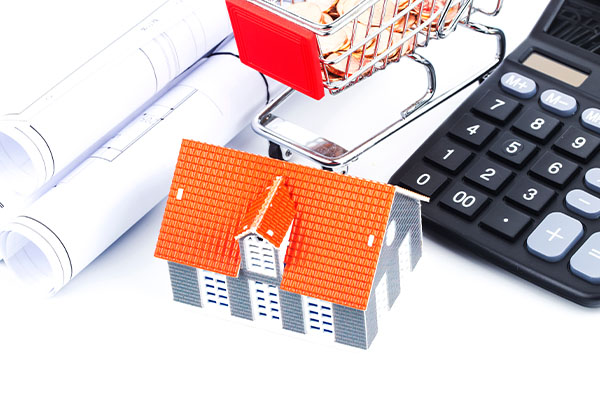
Bad Deals: Only invest in another real estate market with a capable partner who has been through some ups and downs.
There are all these young guys out there at the moment looking for investors. They haven’t been through a downturn. They’ve come straight from college into making huge amounts of money from crypto or whatever. They’re like, “This market will run away forever.” We could be in for some difficult times. I don’t think these guys accept that as possible because they’ve never seen it. I can remember the 1980s. It was dismal.
Interest rates were 16% to 18% on a mortgage. Can you imagine trying to fund that? Why is it impossible that we could go back to something? It’s 40 years now since we had inflation at that level. Therefore, potentially, you could be in a situation now. An economic collapse would be created by it, but an economic collapse is also created by runaway inflation. The guys are going to have to get very serious about this quickly in order to get it under control.
When we look at what happened in 2008, 2009, and 2010, especially here in the United States, you see those individuals running those organizations or institutions retire and leave. You have new people come and take their place and are looking for opportunities, returns, and ways. What do they do? They redo the same thing but call it something different when it’s the exact same crap packaged in a different bag.
That’s the old trick, “Don’t look at what I’m saying. Look at what I’m doing.” It’s the opposite of that. You can get cynical about this stuff, but the reality is it’s about working on your mindset. You know that this is the way the market behaves, and you just try to be above that. I read a lot of books on getting your mindset where it needs to be. It’s to accept this is human nature. This is what’s going to happen. What will happen is the market will go through a staggering downturn. A lot of people will lose their jobs. The politicians will come out and say, “This can never happen again,” and it will start. Everyone will make exactly the same mistakes in ten years, and we’ll be back here again.
Exactly. What’s your favorite mindset book or two that you enjoyed reading or that has been valuable that sticks out to you?
I’ve got a whole library here. There are some of the better ones. I like the Jocko Willink stuff, Extreme Ownership. There’s a great one by a guy called James Clear called Atomic Habits. That’s a good one about establishing good habits because habits are huge. Your behavior, habits, and mindset are all critical. One of the great books I’ve read was Never Split the Difference. It’s by Chris Voss. He’s a hostage negotiator that used to work for the FBI. He’s talking about how to negotiate. That was eye-opening. If you want to go old school, there’s a book that goes way back. It was by a guy called Richard Gambini. It was called Persuasion. It was all about the mindset tricks that people can play. The fact that people give you something for free, there’s now an obligation on your head to give something back.
It’s about understanding these tricks that people can play with you and how marketers use them to influence you. There’s the best stuff, leaving aside modern books if you went back to the stoics 2,000 years ago. Anytime anyone mentioned stoic philosophy to me, I was like, “This sounds straight out of some university professor.” I was like, “I’m not interested. This is all crap.” I’ve been reading it, and it is interesting. Marcus Aurelius, the leader of Rome during the Roman Empire, used to write in his diary every day. You can read those entries translated now. The wisdom in it is insane. He is somebody so powerful, and yet he was trying to get his mindset in check. It’s very interesting stuff, the stoics.
He had some great one that sticks out. Marcus Aurelius’ Meditations comes to my mind in a lot of things. There was another one. The Emperor’s Handbook is another one that is a phenomenal read as well.
Ryan Holliday is a good author for that stuff. He writes a lot about stoic philosophy. He’s come out with a book that I’ve been enjoying. It’s a one-page-a-day book. It’s 366 pages. Each one is dated, so you know what day you should open up. You go through it every day and read a passage. It’s a piece of stoic philosophy. It’s a nice reminder. It takes no more than 3 to 4 minutes to read it. Every morning, I go, “Yeah.” It’s a little mindset pump, and you go, “I got to apply that today.” It’s about grounding yourself.
When you’re enjoying success, it’s easy to think that you’re now more important than this other person or people because you make money and are doing well. The reality is you have to stay grounded and try to say, “I could lose all of this again. There could be a massive collapse in the economy.” Don’t get so cocky, first of all. Don’t get so dependent on all of this wealth and stuff as if it becomes your identity. After 2008, probably more people committed suicide than I knew, from losing their wealth and having no identity beyond being wealthy. It was a tragic thing to see because they had a lot going for them, but they couldn’t see beyond the fact that they were going to be poor for a while. That was tragic.
It’s the same thing. I’ve experienced that with friends and people being very stressed out now, too, with the way things are going in the market that they’ve had to change their whole business model or buy stuff previously, and now they can’t seem to get it. My phone and email get full of stuff, which I’m sure is yours too, Gavin, with people looking for resources.
Here’s one thing that helped me sort it out. When I was at my lowest peak, I found that focus on what you can control and stop worrying about what you can’t control. I started saying, “What can I control? I can control my mindset and my fitness.” I started becoming very focused on my fitness. I used to work out seven days a week, and every morning, I start with a ritual where I work on my mindset. Once you’ve got that, it’s like a little win. The rest of the day might be a disaster, but at least you’ve started with a win.
Amen to that. You got to get up in the morning and start your day with success. A little bit goes a long way and starts the right track. Let’s talk about your podcast. Why did you get into doing your podcast? How’s that been beneficial for you?
I’ll tell you why. First of all, the timing of the podcast was when it was in lockdown. It was the first week of the lockdown in March 2020. We had started the year off thinking, “This was going to be a great year. We were going to make all this money. It was going to be a runaway success.” Suddenly, we were told that we couldn’t go outside the door of the house within 2 kilometers of a circle. That’s just over a mile and a bit. I remember thinking, “The world became very small very quickly.” I started running in the mornings to get some exercise. I remember thinking, “Now’s the perfect time to start a podcast because I got all this spare time. I’ve got lessons to tell. I’ve been through this before.” At the time, I was thinking about COVID-19 and what had happened. It’s the big shutdown, and everyone was panicking about how’s the economy going to work and stuff.
I remember saying, “This is very 2008.” Within the first few weeks, it felt like it was just around about the Lehman Brothers collapse. Everyone was panicking, and I said, “Now’s the time to bring out the podcast and start talking about what I experienced in 2008 and prepare people mentally for it.” That’s how it began. I put out 5 or 6 episodes and started getting feedback. That was mind-blowing. Somebody found me on LinkedIn and said, “Gavin, I want to let you know that I started listening to your podcast two weeks ago. It has really helped. I’ve canceled a deal that I was going to go and do and all this kind of stuff.”
I got more and more of that feedback. It really gave me a lift. I suddenly thought, “I’m doubling down. I’m going to make sure that this is consistent.” I’ve done 126 weeks consecutively and not missed one. It’s been rewarding, I have to say. As a result of doing that, I’ve created a little bit of a mastermind coaching group. The people who like the lessons I’ve been teaching want to join in and pick up some of that stuff.
That’s awesome. What is the best way for our folks reading out there to connect with you, keep with what you’re doing, and join in the mastermind besides reading the blog? What’s the best way for people to connect?
I have a couple of things. I’ve turned my attention to YouTube, so if anyone wants to start to connect with me on a more consistent basis, Gavin J Gallagher on Real Estate is my channel. That’s my main channel. The podcast goes out on the Behind The Facade Podcast YouTube channel as well. Those two are in a regular. There’s the Apple Podcasts and stuff. I have my own personal website, GavinJGallagher.com.
This has been such a great conversation. Gavin. If you weren’t in real estate, what would you be doing? If you found yourself that real estate went away, where would you be? Do you have an idea?
In the media, in some way. I’ve gotten a taste for speaking and making videos, so I feel like that’s where I can impact people. It’s somewhere in that space.
Thank you so much for coming on the show and sharing your history, lessons learned, and then the mindset shift. It’s such an important thing in the world in an up and a down economy. We need to see a little bit more of that from more folks going as we go forward here and start getting on that treachery waters that we’re seeing in the economy mistakes. Thanks so much for coming on, Gavin.
It’s been a pleasure. Thank you.
Guys and gals, check out his channels and listen to his podcast. There are such great lessons learned from decades of experience of ups and downs. Like we said in the beginning, learn more from your mistakes than you’ll learn from your victory. Go out, take some action, and we’ll see you all at the top.
Important Links
- Gavin J. Gallagher
- EastPoint Business Park
- Behind the Facade
- Jocko Podcast
- Extreme Ownership
- Atomic Habits
- Never Split the Difference
- Meditations
- The Emperor’s Handbook
- Gavin J Gallagher on Real Estate – YouTube
- Behind The Facade Podcast – YouTube
- Apple Podcasts – Behind the Facade
About Gavin Gallagher
 Gavin Gallagher has been a real estate investor and developer for over 25 years. Based in Dublin, Ireland where he runs East Point Business Park, a successful office park that he and his family have been developing since the late 90s. Gavin has a wealth of international experience having spent 6-years living and working in London, the south of Spain, Dubai, Qatar, and Ghana in West Africa. He is the host of the popular real estate investing podcast Behind The Facade.
Gavin Gallagher has been a real estate investor and developer for over 25 years. Based in Dublin, Ireland where he runs East Point Business Park, a successful office park that he and his family have been developing since the late 90s. Gavin has a wealth of international experience having spent 6-years living and working in London, the south of Spain, Dubai, Qatar, and Ghana in West Africa. He is the host of the popular real estate investing podcast Behind The Facade.
Want to talk to Scott? Book a call with him HERE
Love the show? Subscribe, rate, review, and share!

